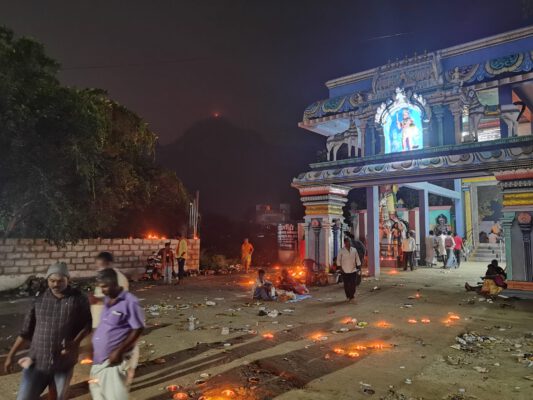In Auroville there is an international zone. An area in the city of the future that wants to give different cultures and nations a place to express themselves and come into contact with each other. People in Auroville should be able to experience these different cultures. The whole concept is quite vague, roughly organized along the lines of continents, with some focus on selected nation states. Aurobindo has written something about some 'national souls', he has tried to characterize them. However, these characterizations date from the first half of the 20th century.
I have always found the concept of the soul itself very problematic, and the concept of the nation is also problematic. A national soul, what is that supposed to be? And a German one at that. The whole world knows how badly that went wrong in Nazi Germany.
Aurobindo's philosophy is essentially about the illumination of consciousness. Not just of one's own subjective consciousness, which has remained in a self-assertive reflex since Descartes' skepticism, but of consciousness itself, as a phenomenon that can be experienced intersubjectively between different forms of life and spiritual realms of experience. Aurobindo's philosophy anchors consciousness in a global spirituality, describing it as divine consciousness. For him, consciousness is the starting point of all existence. This consciousness is real and can be experienced. Through mental and spiritual evolution, we can expand, enrich and transcend our own consciousness. This always sounds so esoteric, but actually only describes something that we observe every day. A person is born and learns, develops a personality and grows intellectually, emotionally, socially, creatively, etc.... At some point in the history of Western cultures, rationality has gained dominance and discredited everything that is alien to it. Taming this rationality and reintegrating it into a holistic context through the practice of yoga is the project of Sri Aurobindo's Synthesis of Yoga.
Sri Aurobindo anchors his philosophy on 7 levels: Matter, Life Force, Rational Thought, Intellectual Worldview, Spiritual Sensuality, Pure Consciousness and Pure Existence. You could say that rational thinking got lost in matter in the 20th century. However, in order to be able to connect all 7 levels, Aurobindo needs the concept of the soul, whose archetype is Purusha. This cosmic soul manifests itself in individual souls, be they mine or yours, or those of animals and plants, planets or nations. Everything is permeated by consciousness, everything has an identity, but the languages are very different.
I still find it very difficult to penetrate the implications of this. It's plausible in the intersubjective realm, and it's an inviting door to spirituality. But when it comes to the German soul, I really have my difficulties. Nevertheless, there seems to be something behind the cultural stereotypes. There are friendships and enmities between cultures, peoples, nations, and there are families of cultures and languages, e.g. the Indo-European language area, the Dravidian languages, or Afro-Asian languages and many others. There are religious spheres of influence that overlap with language areas, cultural areas and national borders. Behind the complexity of these overlaps, which are additionally mixed by colonialism, globalization and socio-economic dynamics, there is perhaps a kind of map of different spheres. Such a map can only be drawn up, if at all, in the spirit of unity in diversity. This seems to me to be the project of the international zone. Perhaps the German Pavilion could house a kind of research center for such a map.
-
"Collections with Maps | Maps | Library of Congress". n.d. Web page. Library of Congress, Washington, D.C. 20540 USA. Accessed June 15, 2023. https://www.loc.gov/maps/collections/.






